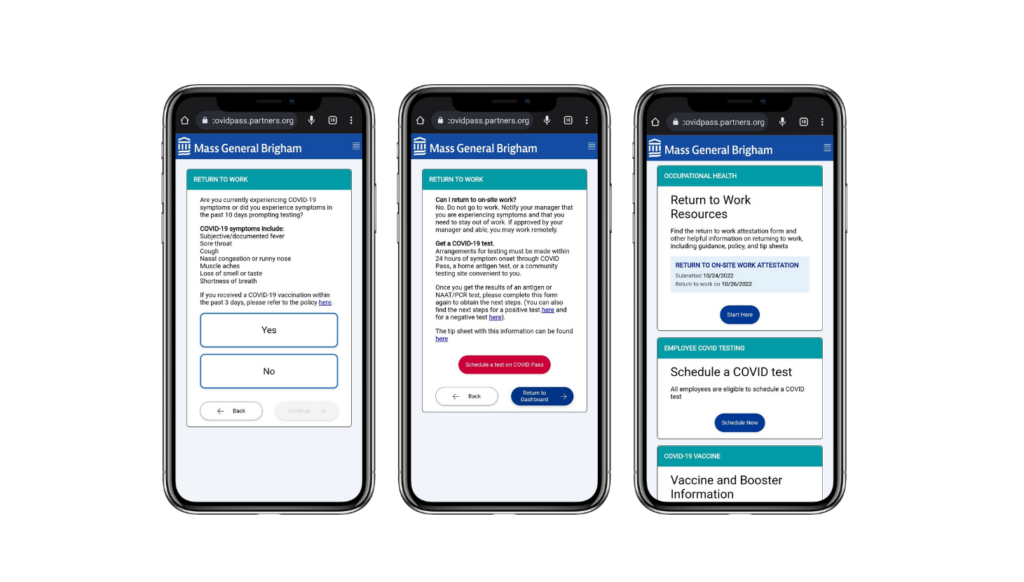Managing an overwhelming number of requests through a chatbot
How can we help employees determine when they can return to on-site work following a COVID-19 infection? The iHub team helped to address this challenge during the Omicron surge earlier this year by rapidly developing and deploying a return to work (RTW) chatbot with some of our colleagues across the Mass General Brigham (MGB) system. Initially, MGB Occupational Health Services (OHS) was inundated with calls from employees seeking answers to commonly asked questions about the return to work policy following COVID-19 infection. The initial version of the RTW chatbot solution helped OHS manage the volume of requests. Should an individual test positive for COVID-19, eventually, they also needed to go to a separate REDCap link to submit an attestation before returning to work. Given both the changing guidelines and challenges facing our workforce, our system needed a more agile solution that would serve the needs of both our employees and staff, as well as OHS overseeing the daily management. Hence, a decision was made upon further evaluation to sunset the original RTW chatbot for a more stable and feature-rich solution.
Improving the employee experience
To improve the user experience of finding RTW resources, the iHub worked with our development colleagues at Mass General Brigham Digital to bring together both the chatbot and attestation features into COVID Pass, the employee-facing COVID-19 application. Today, the RTW feature in COVID Pass consists of two parts – guidance and attestation. RTW guidance prompts the user through a series of multiple choice questions, which at the end lets the user know if they can return to on-site work. The attestation form allows users to attest they meet the RTW requirements following a COVID-19 infection. If a user was COVID-19 positive but now meets the requirements for on-site work after receiving RTW guidance, they will be automatically directed to the attestation form. With the implementation in COVID Pass, employees and staff also can take immediate action towards their personalized recommendations. For example, if a user is symptomatic but has not completed a COVID-19 test, in addition to receiving the appropriate RTW guidance (not cleared for work), the user sees a button that allows them to schedule a COVID-19 test on COVID Pass.

It takes a village to make this happen
Ultimately, this project involved close coordination and collaboration across Mass General Brigham, including colleagues from OHS, Infection Control, and Digital teams. The development sprint cycle began with gathering requirements. Led by Gabrielle Choo-Kang, the iHub team conversed with OHS to understand the challenges they were facing and what information they would like to have with respect to allowing employees to return to work. One of the gaps with the existing RTW tools is that they did not capture how long it was taking employees to RTW, a metric that OHS wanted to know. Thus, when identifying the fields for the attestation, it was important to document dates and the number of days following COVID-19 infection that the user was able to return. While laying out the entire user flow with a giant decision tree, the iHub worked with OHS and Infection Control to ensure the logic and language adhered to the RTW policy. Once the user flow was finalized, the iHub team created high-fidelity wireframes and met with the application development team to build and test the features. For the release, Infection Control was able to launch its updated systemwide policies in locked step with the launch of the RTW features on COVID Pass.
Future considerations
The implementation of RTW features in COVID Pass has helped shift the application from a simple symptom attestation form to an employee COVID-19 resource center. Since the update in mid-October, the RTW tools in COVID Pass have helped more than 100 employees safely return on-site following a COVID-19 infection, and this number does not include users who are not required to submit an attestation prior to RTW. The iHub team is looking forward to the future of COVID Pass and the opportunities to support employees and departments across the institution through the application.

